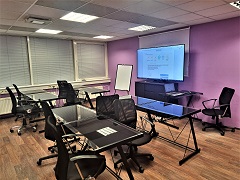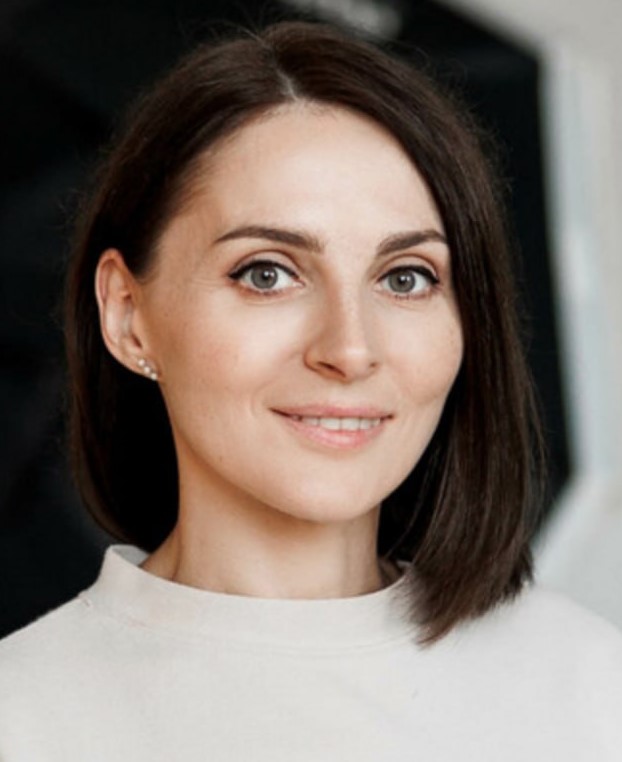Prototyping in Figma and UX/UI design - intensive course
Information about training in this course.
Course objective: Provision of fundamental theoretical knowledge in UX (User Experience) and basic practical skills in UI (User Interface), necessary for designing websites and user interfaces.
Target group: The course is designed for those who wish to start a career in the IT field without programming skills and learn how to create website designs and user interfaces using Figma. A laptop is provided for the duration of the training if needed.
Course description: Upon successful completion of the course assignments, you will compile case studies for your first portfolio and be able to start working independently in the field of interface design.
Requirements for students:
confident PC user
It is desirable to have a personal laptop (Windows/Mac, 8 GB RAM, screen size > 13.3 inches); a laptop will be provided for the duration of the training if needed.
Learning outcome:
Those who complete this course:
are proficient in conducting user research
create user flows in Miro
are able to create wireframes (interface sketches) and prototypes
understand the principles of graphic design
create interface design using Figma
create static web pages using HTML5 / CSS3 in accordance with modern standards
understand the principles of responsive design and are able to create interfaces suitable for different devices and screen resolutions.
Training methods:
The total course volume is 252 academic hours, of which 126 academic hours are conducted in the classroom (including 8 academical hours of practical sessions and 2 seminars totaling 8 academic hours).
Evaluation criteria for learning outcomes:
Learning outcomes are assessed based on independently completed practical work.
Evaluation methods:
Upon successful completion, practical and homework assignments receive a "pass" grade.
Course completion conditions:
To successfully complete the course and receive a certificate, it is necessary to achieve a "pass" grade on 75% of the homework assignments.
Additional information:
Training program group: 0613 - Software analysis and development (0613 - Tarkvara ja rakenduste arendus ning analüüs)
Basic rules for training organization (in Estonian)
Basic rules for ensuring the quality of the educational process (in Estonian)
Course program
Module
Main topics
Volume
Introduction to the concept of UX/UI design
Basic concepts of UX and UI.
The difference between them and their roles in the development process.
4 ac/h
Basics of working in Figma.
Workspace and tools.
Basic forms.
Vector tools.
Basics of working with images.
Masks.
Hierarchy in the document.
Basics of working with text.
12 ac/h
Landing prototype
Basics of design based on Figma.
Composition in design.
Typography and readability.
Color theory in user interface design, working with palettes, and selecting color combinations
Grids, spacing, and layout.
Searching and selecting images, copyright, and using neural networks in design.
16 ac/h
HTML/CSS, basics of layout design.
HTML5 standard.
Main tags.
Page rendering in the browser.
DOM model.
Virtual DOM.
Main web developer tools. IDE (Visual Studio Code). VCS
22 ac/h
UX research. Miro/FigJam
Product hypothesis and research.
Creating a hypothesis.
User research and competitive analysis.
Empathy map.
Creating persons.
Whiteboard Challenge.
Userflow.
Customer Journey Map.
16 ac/h
UX design
Wireframing.
User tests.
User test analysis.
Wireframe iteration.
16 ac/h
Developing a website prototype based on UX research.
Advanced Figma techniques.
Auto Layout.
Creating components.
Styles in Figma.
Figma plugins.
Кликабельный прототип.
Usability testing.
Prototype iteration.
32 ac/h
Preparing the prototype for handoff to development.
Creating responsive designs.
UI-kit development.
8 ac/h
Requirements for students:
Learning outcome:
Those who complete this course:Training methods:
The total course volume is 252 academic hours, of which 126 academic hours are conducted in the classroom (including 8 academical hours of practical sessions and 2 seminars totaling 8 academic hours).Evaluation criteria for learning outcomes:
Learning outcomes are assessed based on independently completed practical work.Evaluation methods:
Upon successful completion, practical and homework assignments receive a "pass" grade.Course completion conditions:
To successfully complete the course and receive a certificate, it is necessary to achieve a "pass" grade on 75% of the homework assignments.Additional information:
Training program group: 0613 - Software analysis and development (0613 - Tarkvara ja rakenduste arendus ning analüüs)Basic rules for training organization (in Estonian)
Basic rules for ensuring the quality of the educational process (in Estonian)
Course program
| Module | Main topics | Volume |
| Introduction to the concept of UX/UI design |
|
4 ac/h |
| Basics of working in Figma. |
|
12 ac/h |
| Landing prototype |
|
16 ac/h |
| HTML/CSS, basics of layout design. |
|
22 ac/h |
| UX research. Miro/FigJam |
|
16 ac/h |
| UX design |
|
16 ac/h |
| Developing a website prototype based on UX research. |
|
32 ac/h |
| Preparing the prototype for handoff to development. |
|
8 ac/h |
Course information
Time of conduct:
12.01.2026 - 12.04.2026
19.01.2026 - 19.04.2026
Timetable:
Mon, Wed, Fri 17:45 - 21:00
Register here
Course length: 3 months
Format and place of conduct:
Address: Tartu mnt. 18, Tallinn.

The course is conducted in a classroom format, in a modern computer class. The group size ranges from 6 to 10 people.
Training language: english
Cost: 2450 EUR (VAT 24% included)
Total course volume: 252 ac/h
Includes:
Tutors
Elvi Vel
 Qualification: Over 7 years of experience in graphic design. Specialization: Graphic design, interface design
Qualification: Over 7 years of experience in graphic design. Specialization: Graphic design, interface designTeaching experience: Over 10 years of teaching experience.
Education: Estonian Academy of Arts, Iati, higher education, (2007).
Roman Kutselepa
 Qualification:
Qualification:Over 5 years in software development. Specialization: Web design, development in JavaScript, effective use of software products in the company.
Teaching experience: Over 5 years of experience in teaching and staff training.
Education: Anglia Ruskin University 2010. (United Kingdom)